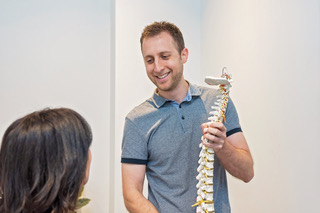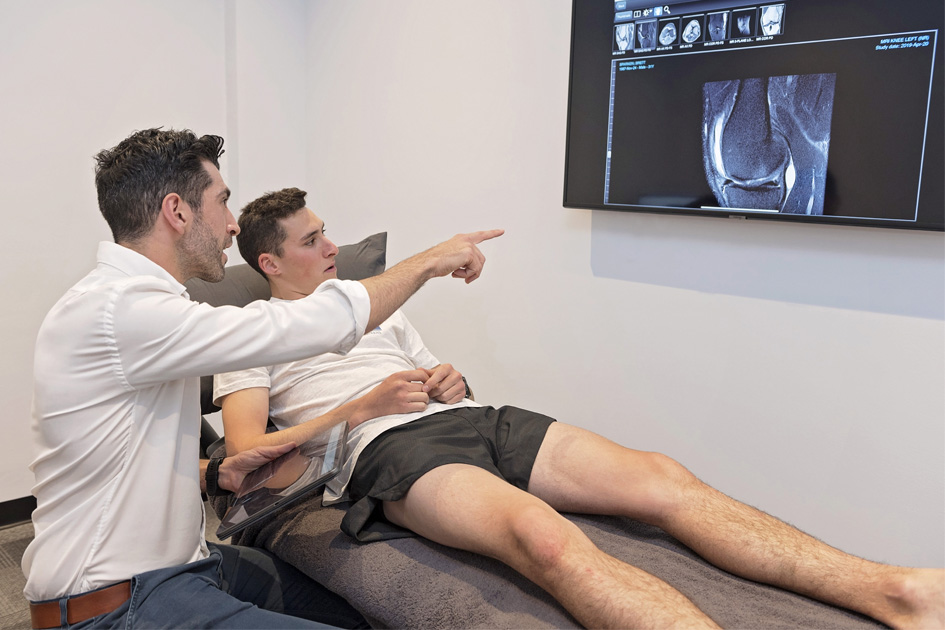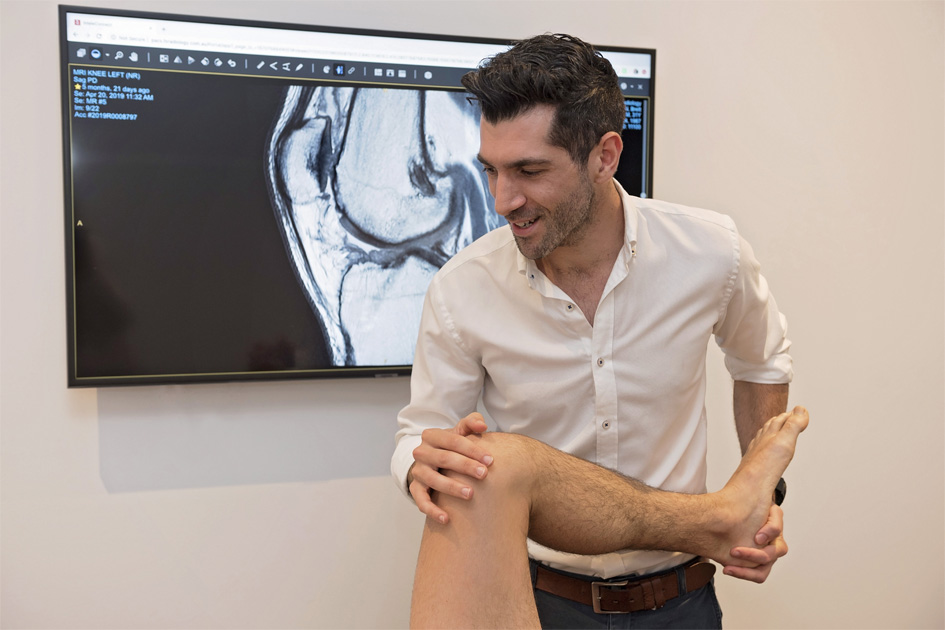Physiotherapy
Physiotherapy strives to work collaboratively with like minded clinicians and its patients to provide an integrated approach to healthcare concerns. We believe that the patient is at the core of their treatment paradigm and as such, we want you to be involved every step of the way when resolving your health concerns.
Treatments and programs are specifically tailored for you and your overall health so that our input leaves you feeling better for the long run.
Physiotherapy combines uniformly with other modalities of healthcare such as chiropractic and podiatry treatments. As such we always consider the patient, their values and other possible measures that may be necessary to ensure you are being fully looked after.
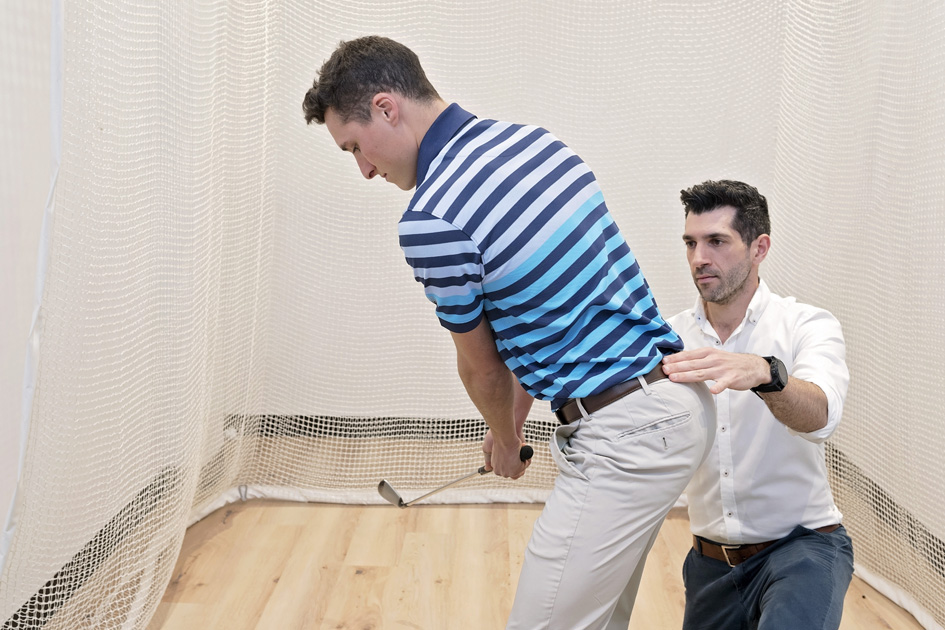
About Our Clinic
Meet Our Physiotherapists
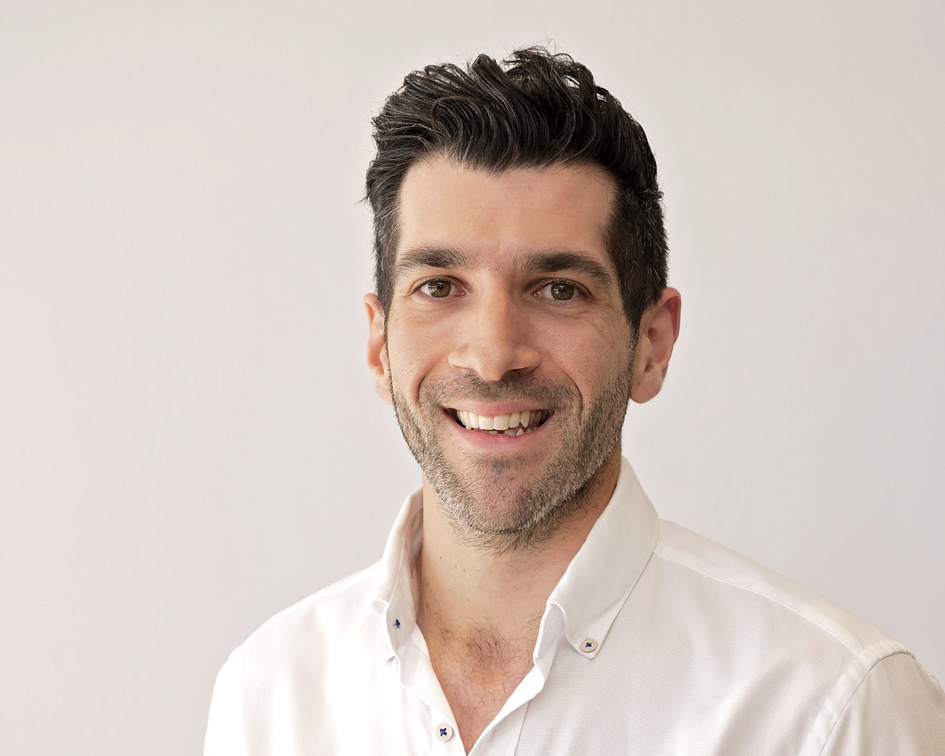
Peter Kipreou
Peter qualified from the University of South Australia with a Bachelor of Human Movement and a masters in physiotherapy, as well as post graduate qualifications in Chronic Conditions and Pain Management at Flinders University. In his time as a physiotherapist, Peter has focused his treatment techniques on blending his knowledge of physiotherapy and strength and conditioning into his treatment style which provides patients with a long term solution to their presenting complaints. Peter enjoys seeing a variety of different types of patients and has a keen interest in the sporting hip and groin, low back pain and biomechanic analysis of movement. What he is most passionate about is working with like minded health practitioners to provide long term, sustainable outcomes for his patients and listening carefully to how he can best help them, so that they can continue to do what they love. In his time away from the clinic, Peter enjoys a hit of golf with his mates and learning about food and wine.
Qualifications:
Bachelor of Applied Science, Human Movement and Health Studies
Masters of Physiotherapy
Graduate certificate in Chronic Conditions and Pain Management
Level 1 Titlelist Performance Institute Physiotherapist
Certificate III and IV in fitness
Past and Present Roles
Adelaide United Youth Team Physiotherapist 2014-2017
Medical Director for Hockey SA 2017- Current
Associations
Sports Medicine Australia
GEMt dry needling Australia
Australia Physiotherapy Association
Titleist Performance Institute
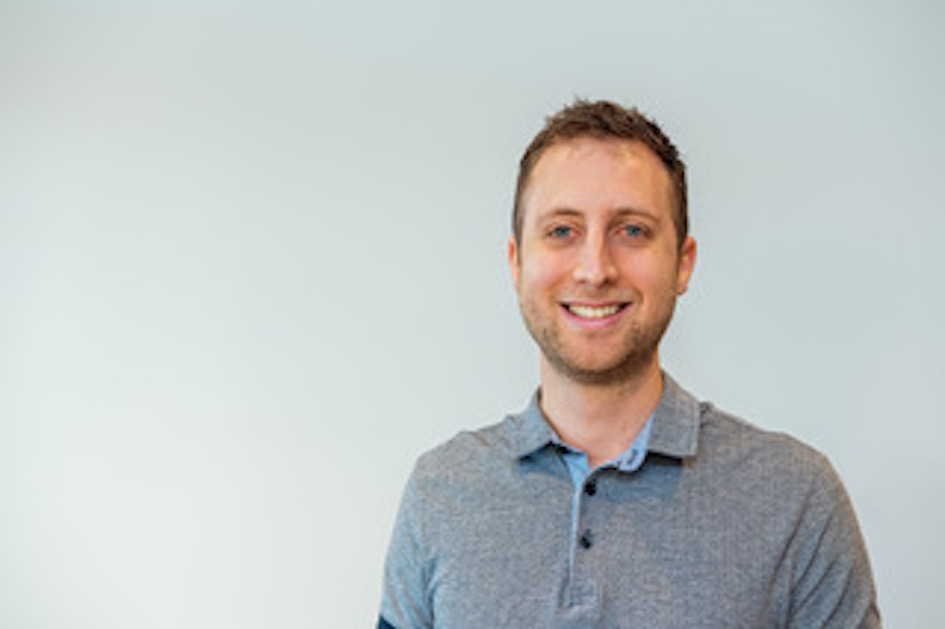
Joseph Polisena
Joseph graduated from the University of South Australia with a Bachelor of Applied Science (Human Movement and Health Studies) and a Masters in Physiotherapy. Throughout his career Joseph has been passionate about advocating for and delivering effective treatment of musculoskeletal conditions. He has a particular passion in understanding and treating spinal disorders, hip and shoulder complaints as well as helping individuals with their rehabilitation post-surgery. He endeavours not only to help patients in the short term but explores the broader picture to support lasting and long term results. Based on a detailed and thorough assessment, Joseph combines effective hands on therapies with his vast knowledge of exercise and education strategies to help achieve and sustain health and fitness goals.
Being involved in sports from a young age, Joseph also has a keen interest in treating sports injuries and has worked as a physiotherapist for professional and semi-professional athletes. Having played soccer at a local premier league level, Joseph now thrives on helping emerging stars stay fit and work toward their sporting goals.
Other current roles:
Club Physiotherapist at MetroStars Soccer Club
Member of Sports Medicine Australia
Australian Physiotherapy Association

Alec Maiolo
Alec graduated from the University of South Australia with a Bachelor of Physiotherapy in 2020. In his time as a Physiotherapist, Alec enjoys seeing a variety of different types of patients, with a particular interest in diagnosing and rehabilitating lower limb sporting injuries, hip and shoulder complaints, and helping individuals with their rehabilitation post surgery. He loves educating patients about their diagnosis and empowering them with the information and skills to actively manage their presenting complaint. He also implements effective evidence based hands on therapies combined with his extensive knowledge in exercise to help the patient achieve their health and fitness goals. In his time away from the clinic, you will either find Alec on the soccer field playing for a local state league team, at the dog park with his Italian greyhound or with family and friends.
Our Mission Is to Provide a Professional & Honest Approach to Health Care
What is VALD Technology?
ForceDecks
ForceDecks are a dual force plate system that are able to automatically detect and assess over 20 different movements, including squats, jumping patterns, isometric strength, sit to stand and balance. While the client is performing the desired movement on the ForceDecks, we can use an iPad to capture a video as you perform the test, with the data and footage automatically synchronized, annotated and ready for analysis as soon as you finish the test.
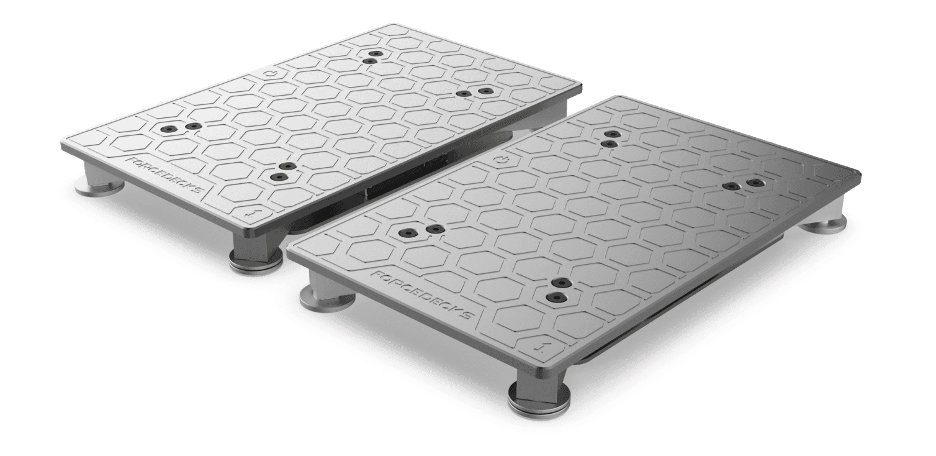
DynaMo
DynaMo is an intuitive and versatile all in one handheld dynamometer. The DynaMo combines tension and compression force measurement, dedicated grip measurement and inertial measurement in one system, capable of performing almost any test imaginable for strength and range of motion assessment
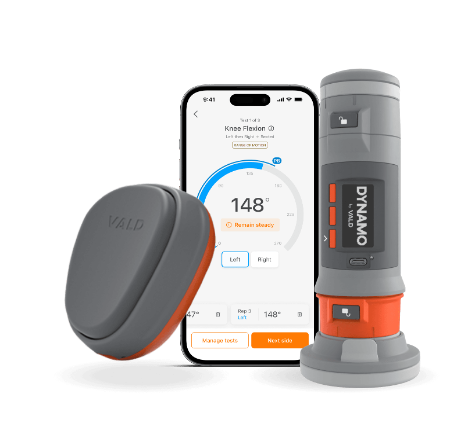
VALD Hub
VALD Hub is where all your results from testing are stored. The VALD Hub allows us to track your results with an extensive range of metrics, analyze any asymmetries, track progressions from previous tests, and compare your results with age, sex and even sport specific normative data.

How can VALD technology benefit you?
Isometric muscle strength testing – studies correlating isometric muscle strength to muscle function. This is broken down into rate of force development (RFD) and peak force measures.
Functional movement patterns: assessing squat kinematics, jumping and landing kinematics (examples may be return to sports, return post operatively, late stage rehabilitation). Movement patterns under load, change of velocity/change of surface etc.
Key performance indicators – jump height, ground contact time (GCT), reactive strength index (RSI) – sports populations for these (specialized test)
1RM max testing equivalents (max isometric squat/max isometric push/max isometric pull) correlated to 1RM loads
Assess proprioception and balance affected side vs non affected side
Compare the client to normative data within the population (age group specifics) or %BW to be produced for specific area
Compare the client to non affected side (e.g. quad index affected side/non affected side x 100) for return to play or return to normal function post injury or intervention.
GLA:D Physiotherapy
Adelaide Sports offers the GLAD program which was developed by LaTrobe University to help those living with hip and knee osteoarthritis. The GLAD program is respected by General Practitioners, Orthopaedic surgeons and Allied Health professionals as a holistic treatment program that yields sustainable results for patients who take part in the program. Learn more below!
What is GLA:D?
GLA:D is an education program developed by researchers in Denmark for people with hip or knee osteoarthritis symptoms. It was then brought to Australia in 2016 to help Australians with hip or knee osteoarthritis.
What Does GLA:D Involve?
This education and exercise program reflects the latest evidence in osteoarthritis (OA) research. It also includes feedback from people with OA and trainers on what works in the real world to help patients manage their symptoms.
The Benefits of GLA:D
Participants of the program will be educated about the best efficacy for the hip and knee osteoarthritis and appropriate self support management strategies to help them move and feel better. It is a well rounded program that yields results!
Structure of our GLA:D Program
- Initial appointment – explaining the program and measuring your current functional ability
- Two education sessions which teach you about OA, its risk factors, treatment options and self management strategies
- Group exercises sessions twice a week for six weeks to improve your control of the joint, your confidence in the joint and your strength. Our GLAD class times are Monday 11:30-12:30pm & Tuesday 2:15-3:15pm
- A review at three months with your clinician to discuss progress and goals, and re-measure your functional ability, completion of a questionnaire on registration with the program, and then again at 3 months and 12 months after registration to measure changes in areas such as pain, function, quality of life and medication use
Services
Joint mobilisation techniques
Sometimes as a result of injury or dysfunction, a joint will become stiff or not move efficiently.
Physiotherapists can use various passive joint techniques to gently encourage the appropriate
movement of a particular joints, and this technique can be use as an adjunct to massage therapy.
Your physiotherapist can also teach you self mobilisation techniques to help your dysfunction, a
great way to encourage patient centred care and develop a working understanding of your
condition and working towards a great outcome.
Exercise Programming and Performance
Exercise Prescription and Programming is a foundation of thorough physiotherapy practice. Your
physiotherapist will sit down with you to discuss the best way to tackle exercise programs and
improve your health or better your performance. Providing a plan for you in consideration of your
needs will be the best way to ensure you achieve the best results possible. From the elite
sportsperson to the person wanting to change their habits for the better, we are here to help you
reach your goals.
Physiotherapist Supervised Exercise Classes
Are you struggling to reach your health and movement goals? Finding it difficult to return to exercise following injury? Lacking the confidence, strength and flexibility to comfortably achieve your day to day tasks? If so, then our small Physiotherapist Supervised Exercise Classes may be for you.
With a maximum of four participants per class, our small group exercise classes are specifically tailored to your individual goals to ensure that you are supported and safe on your exercise journey.
Soft tissue therapy
Physiotherapists use a variety of techniques such as myofascial release, massage therapy, trigger
point therapy and deep tissue massage to provide relief of pain and restore function.
Functional Movement Assessments
about why an injury may have occurred. Just as importantly, why they may keep coming back!
Physiotherapists can assess your functional movements and see where impairments lie. Adelaide
Sports Physiotherapists use integrative and collaborative technology via the AXIT system to help
Dry Needling
A treatment technique where sterile acupuncture needles are used to release trigger points of any muscle in the body in order to reduce muscular pain.
Hydrotherapy
Hydrotherapy is a method of rehabilitation that uses the water’s buoyancy force to offload tissues and help in the rehabilitative process when land based exercises may not be suitable. Hydrotherapy has benefits for a range of musculoskeletal conditions e.g. postoperative rehabilitation, osteoarthritis, chronic back pain, acute sports or work related injury. The buoyancy of the water alleviates some of the weight-bearing load on the body, allowing exercises to be incorporated to improve your movement and strength in a therapeutic environment.
How do I get started?
Our hydrotherapy programs are initially planned during a 1:1 consultation with one of our physiotherapists who will individually prescribe exercises suited to your needs. Following this you will carry out your program in a physiotherapist supervised group class. Call our practice to find out more information about our hydrotherapy services.
Injury Triage
referred for the best modality of imaging (X-ray, ultrasound, CT, MRI), with exceptional
communication with your GP and other health care practitioners a long the way.
Mat Pilates
Mat Pilates is a low impact form of exercise appropriate for beginners right through to experienced movers. With a strong focus on strengthening, lengthening and stabilizing the body, Mat Pilates utilizes body weight and small pieces of equipment such as light weights, resistance bands and chi balls to strengthen your body and retrain dysfunctional movement patterns.

